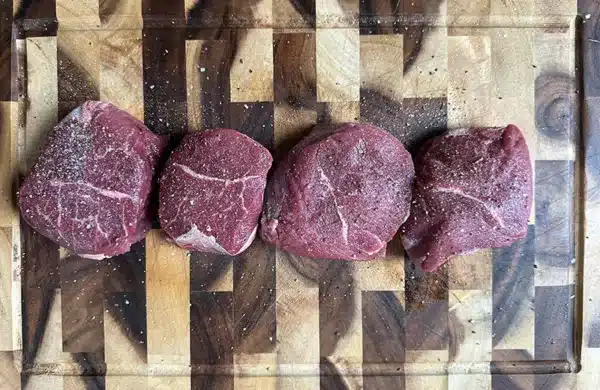Cholesterol Schmolestrol!

Submitted by member Greg Johnson.
Should we be concerned about the cholesterol content in meat? Common knowledge dictates that eating foods high in cholesterol increases your susceptibility for heart attack or stroke, but does the evidence support this view? On the surface, it seems irrefutable. With the consistency of foods like meat and butter it seems obvious that they would clog a pipe, and so it follows that if you eat them they will clog your arteries. Stated plainly, that view is fundamentally incorrect.
First let’s look at why we would even consider cholesterol important in the context of health and disease. High blood cholesterol has been implicated as a risk factor in the progression of cardiovascular disease due to a correlation with higher levels of blood cholesterol and the presence of atherosclerosis; a condition where the blood vessels become progressively narrower and lose their elasticity. A few different protein carriers transport cholesterol in the blood, the two most commonly discussed are the High Density Lipoprotein (HDL) the “good” cholesterol, which even the general public recognizes as the “good” cholesterol, and the Low Density Lipoprotein (LDL), the “bad” one. This, by the way, is how cholesterol is measured in a standard cholesterol blood test; a reading of 80 milligrams per deciliter, (80 mg/dl) LDL cholesterol, 60 mg/dl HDL cholesterol would be a great reading for a healthy person. These numbers reflect the amount of cholesterol that is being carried by each of those lipoproteins; however, it does not provide any information as to the health of your arteries. High cholesterol is not a disease in itself, it just has an association with atherosclerosis, and thus it is perfectly reasonable to have high blood cholesterol and no sign of atherosclerosis.
Atherosclerosis is the hardening and narrowing of blood vessels due to the buildup of lipid and mineral particles in the sub endothelial space of an artery. Some of the cholesterol present in this deposition is bound to the LDL transport protein; this is why LDL is called the “bad” cholesterol. As the popular theory goes, if the cholesterol content of the blood is high, then the chance of cholesterol being deposited in the artery wall is greater. Once these particles are in the sub endothelial space, immune cells descend on the area to clean up the mess. The “mess” becomes what is known as a plaque. If the sub endothelial space ruptures, then the plaque can block an artery, causing either a heart attack or stroke, depending on which artery is blocked. It is important to remember that this is what atherosclerosis and its associated problems are, regardless of your HDL or LDL cholesterol level, without this deposition and hardening and thickening occurring there is no atherosclerosis, and therefore, no risk. Barring any sort of electrical problems with the heart, it is rather difficult to have a heart attack without atherosclerosis.
Whether or not blood cholesterol is the main driver of atherosclerosis and cardiovascular disease is a topic of much greater debate than what I will tackle here. What is much more easily settled is the importance of cholesterol in the diet, which is much less contentious.
So for now we ask the very fair question; what about dietary cholesterol? Does eating a diet high in cholesterol affect the levels of cholesterol in the blood? The short answer is: a little. Full body stores of cholesterol that are incorporated into cell membranes and used in bile acid production are on the order of about 50 grams per person and daily internal cholesterol production is on the order of about a gram per day. The average American female consumes 225 mg/day of cholesterol, while the average American male consumes 307 mg/day [2]. So the intake is quite small compared to the total production and extremely small compared to the overall body content.
It turns out that cholesterol is such an important nutrient that the body very tightly regulates absorption, production, and excretion to maintain pretty constant levels. If we look at a study that controlled for cholesterol intake, we see that the average difference in blood cholesterol content of people on a diet that contains 150 mg/day of cholesterol and people on a diet that contains 350 mg/day of cholesterol is equal to approximately 9 mg/dl, which would correspond to about a 5% difference in blood cholesterol [3]. So even at the high and low end of intake, the blood content is barely altered in free-living subjects. Other reviews looking at the effect of dietary cholesterol on serum cholesterol seem to converge on results of serum cholesterol increasing 4-5 mg/dl for every 100 mg/day increase in intake [4]. When considering that this 4 mg/dl change is out of a total value that is usually around 180 mg/dl it seems quite trivial. Furthermore, we see from other studies that even with this change in total cholesterol, the majority of this change is accounted for by an increase in HDL cholesterol, which is considered to be non atherogenic [5].
So experimental evidence seems to indicate that dietary cholesterol has a very small impact on the levels of cholesterol in the blood, especially when compared to other dietary factors and disease states. Therefore, dietary cholesterol should not be feared nearly as much as it currently is in the mainstream, as it has little association with blood levels of cholesterol, and a very spurious association with atherosclerosis. And we are now learning that there are much better predictors of cardiovascular disease than just cholesterol content, things such as TC/HDL ratio, particle number of LDL, and size of the LDL particle all are currently being studied as potential replacements for the classic cholesterol reading. The realization by the public that there is more than one reason why cholesterol in the blood may be high is one that is taking time to fully stick. Overall, it is important to remember that a balanced diet is key to maintaining overall health, so enjoy your Walden meat, guilt-free!
Greg Johnson received a BA in biology and neuroscience from Williams College and will begin his PhD program in neuroscience at the University of Vermont this fall.
References:
- Sachdeva A, Cannon CP, Deedwania PC, Labresh KA, Smith SC Jr, Dai D, Hernandez A, Fonarow GC. Lipid levels in patients hospitalized with coronary artery disease: an analysis of 136,905 hospitalizations in Get With The Guidelines. American Heart Journal. January 2009. Volume 157 Issue 1 Pages 111-117.
- Wright JD, Wang CY, Kennedy-Stephenson J, Ervin RB. Dietary intake of ten key nutrients for public health: United States: 1999-2000. Advance Data. April 2003. Volume 334 Pages 1-4.
- Keys A, Anderson J, Grande F. Serum cholesterol responses to changes in the diet: the effect of cholesterol in the diet. Metabolism. July 1967. Volume 14 Issue 7 Pages 759-765.
- Hegsted, DM. Serum cholesterol response to dietary cholesterol; a re-evaluation. The American Journal of Clinical Nutrition. August 1986. Volume 44 Pages 299-305.
- Barona J, Fernandez M. Dietary cholesterol affects plasma lipid levels, the intravascular processing of lipoproteins and reverse cholesterol transport without increasing the risk for heart disease. Nutrients. August 2012. Volume 4 Issue 8 Pages 1015-1025.
Related Posts

Grilled Mediterranean Chicken Thighs
This straightforward and fresh recipe for chicken thighs on the grill brings out the flavors of heritage pasture-raised chicken.

Walden Family Farmers: Jamie and Amy Ager
This is about building something better—for the land, for farmers, for communities, and for the future.

Learning to Love the Scotch Tender
Scotch Tender isn’t just a quirky cut. It’s a reminder of what real, pasture-raised meat is all about: variety, flavor, and connection to your food.